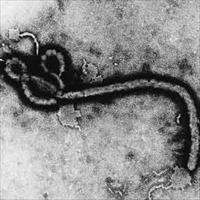UGANDA: Fears of Ebola spread as more cases reported

Medical authorities in Uganda have expressed concern over the possible spread of the deadly Ebola disease in the western region after suspected cases were reported in two neighbouring districts.
Sam Zaramba, the director of medical services in the health ministry, told IRIN on 3 December that a patient with symptoms similar to those reported in Bundibugyo district, the epicentre of the outbreak, died on 2 December at Mbarara hospital, farther southwest, causing fears that the disease was spreading out of Bundibugyo.
Another suspected case had also been isolated at Virika hospital in Fort Portal district, next to Bundibugyo, Zaramba said.
"We are waiting for the results of the samples for the two suspected victims," he told IRIN by telephone.
Another medical official, who requested anonymity, said: "There is cause to worry when we start getting these cases overshooting and appearing in other areas because this complicates contact surveillance. One medical officer who worked on the first cases but moved to Kampala [the capital] to attend to personal issues has also fallen sick and was admitted to Mulago [the main hospital in Kampala]; we are trying to follow his contacts."
Several dozen medics and support staff have fled western Uganda after their co-workers became infected with the virus in an outbreak that has already killed 16 people and infected at least 58 others.
A government official in Bundibugyo, Samuel Kazinga, said a quarantine had been declared in all homes in the district that had registered a case in order to control contacts and ease monitoring.
"We are mobilising the public to take precautionary measures through public announcements on the radio and talking to people through community [leaders]," Kazinga said.
He said Bundibugyo had appealed for help but efforts to contain the outbreak, which began in September although it was only identified as Ebola last week, have been hampered by lack of medical personnel.
"We have a shortage of health workers and we need more because those who were there on the ground have been infected: two doctors, a medical officer and a nurse. We are trying to get more medical workers to go to the region and help in the fight," said Zaramba.
Zaramba had initially said two more patients succumbed to the virus on 1 December, bringing the toll to 18. But the health ministry on 3 December revised the number back to 16, saying the two deaths had since been confirmed as due to other causes.
"Cumulatively, we now have 16 deaths and 58 cases," he said.
Patients were quarantined in Bundibugyo hospital's isolation ward near the border with the Democratic Republic of Congo (DRC), which has had outbreaks of the virulent disease in the past.
"Those admitted are mainly health workers and those who attended to the patients," Zaramba said.
Previous Ebola fatalities among medical workers have been blamed on poor sanitation and hygiene in health centres that lack protective suits, masks, latex gloves and other equipment.
Ebola spreads through body fluids, particularly blood, putting health workers without protective gear at risk. Ebola sub-types usually attack capillaries and blood vessel linings, so patients lose blood rapidly, and die of shock, doctors say.
The new Uganda subtype kills patients by provoking high fever, but without much loss of blood. There is no vaccine or cure for Ebola.
"The situation is not yet under control," Zaramba said. "The main challenge we are facing is detecting cases and following up on those who had contact with the patients."
A team of epidemiologists and virologists arrived in the region on 1 December to try to retrace the source of the virus as part of a campaign to avoid future epidemics.
Authorities said a team of pathogen experts from the Centers for Disease Control in the US were expected in the country on 4 December to beef up the local response to the disease, including bringing laboratory facilities to detect infections more easily.
An outbreak killed at least 170 people in Uganda's northern Gulu district in 2000. Another recent outbreak killed at least 26 people in DRC's West Kasai region.
The Ebola virus was first identified in 1976 in Sudan and in a nearby region of DRC, then Zaire. Outbreaks of Ebola have also occurred in the Ivory Coast and Gabon.
 Back and Next - Back and Next
Back and Next - Back and Next See Also - See Also
See Also - See Also